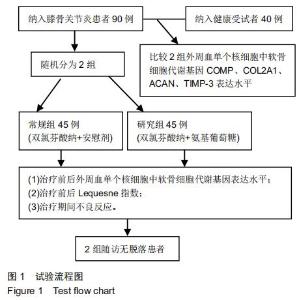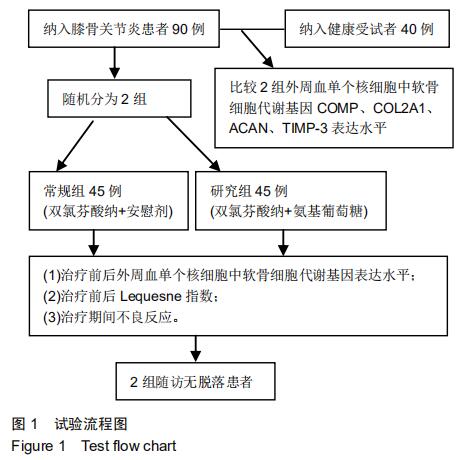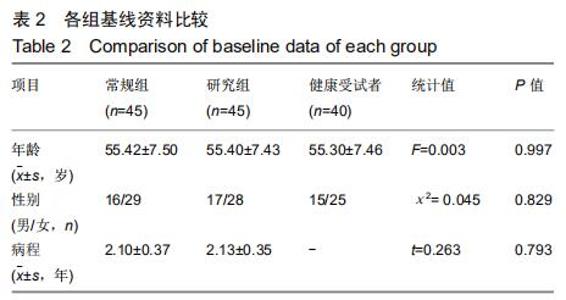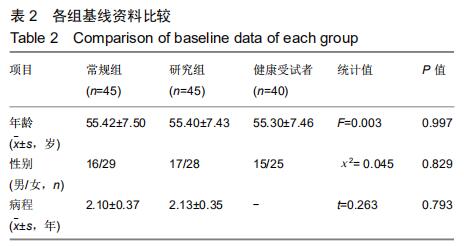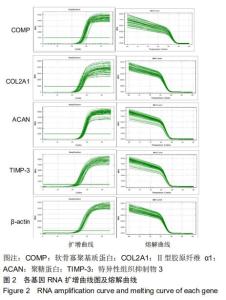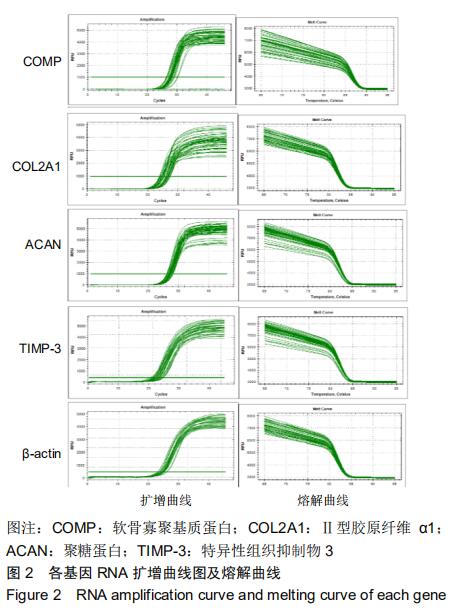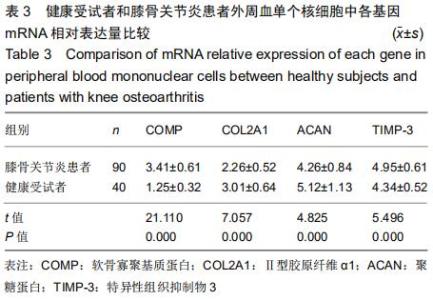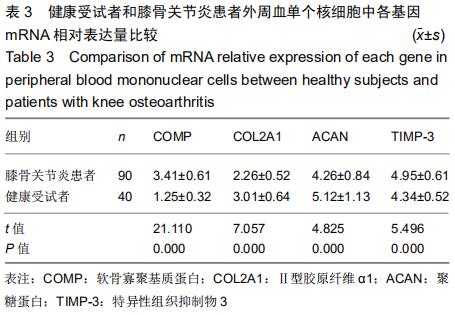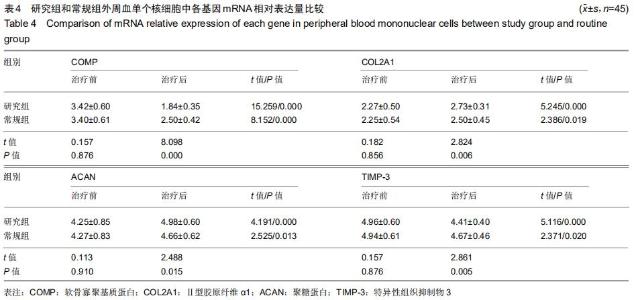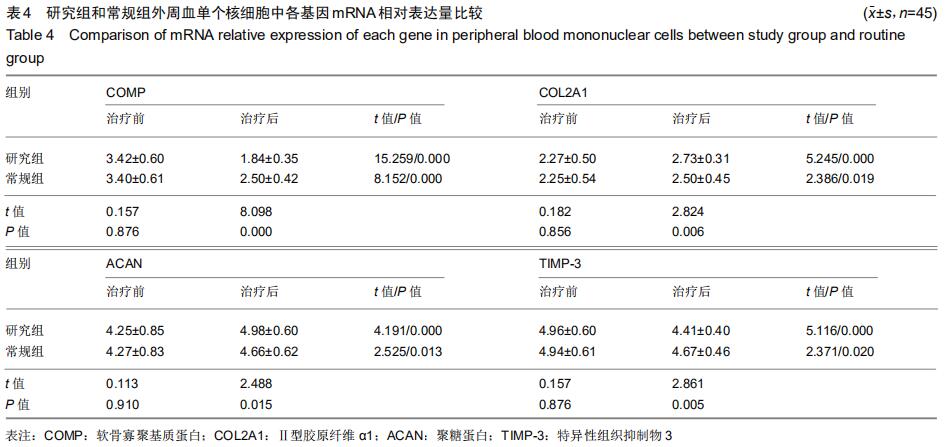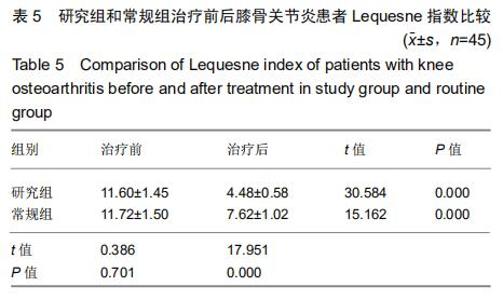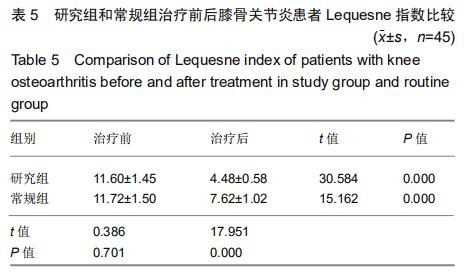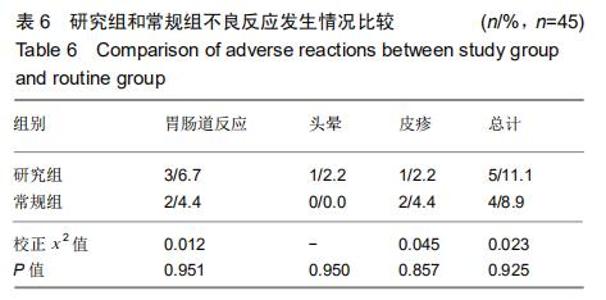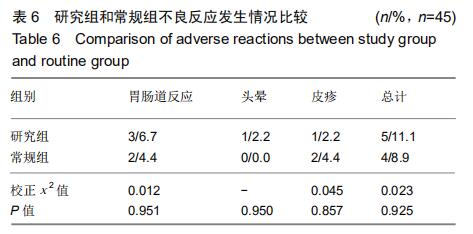|
[1] CARMONA-TERÉS V, MOIX-QUERALTÓ J, PUJOL-RIBERA E, et al. LUnderstanding knee osteoarthritis from the patients' perspective: a qualitative study. BMC Musculoskelet Disord. 2017;18(1):225.
[2] ABBASI J. Can Exercise Prevent Knee Osteoarthritis? JAMA. 2017; 318(22):2169-2171.
[3] 张洪美. 膝骨关节炎的规范诊治与阶梯治疗[J].中国骨伤,2019,32(5): 391-395.
[4] MAKOLINETS KV, MAKOLINETS VI, MOROZENKO DV, et al. Dynamics of biochemical markers of connective tissue metabolism in patients with knee osteoarthritis during conservative treatment with laser therapy. Wiad Lek. 2019;72(5 cz 1):802-806.
[5] MIN S, WANG C, LU W, et al. Serum levels of the bone turnover markers dickkopf-1, osteoprotegerin, and TNF-α in knee osteoarthritis patients. Clin Rheumatol. 2017;36(10):2351-2358.
[6] DOU X, ZHANG Z, WANG S, et al. Combined use of Serum miR-338-3p, Cartilage Oligomeric Matrix Protein and Chondroitin Sulfate-846 in the Early Diagnosis of Knee Osteoarthritis.Clin Lab. 2019;65(3):124-129.
[7] 陈伶,曾勇,蒋华,等.盐酸氨基葡萄糖对膝关节骨性关节炎患者血清IL-1β、IL-6、TNF-α的影响[J].西部医学, 2017, 29(8):1101-1105.
[8] LUBIS AMT, SIAGIAN C, WONGGOKUSUMA E, et al. Comparison of Glucosamine-Chondroitin Sulfate with and without Methylsulfonylmethane in Grade I-II Knee Osteoarthritis: A Double Blind Randomized Controlled Trial. Acta Med Indones. 2017;49(2):105-111.
[9] LOMONTE ABV, MENDONÇA JA, DE CASTRO BRANDÃO G, et al. Multicenter, randomized, double-blind clinical trial to evaluate efficacy and safety of combined glucosamine sulfate and chondroitin sulfate capsules for treating knee osteoarthritis. Adv Rheumatol. 2018;58(1):41.
[10] 胡海霞,王陵,李晨,等.截断混合高斯分布入组模式下生存资料样本量估计[J].中国卫生统计, 2019, 36(3):322-326.
[11] 曾学军. 《2015年美国风湿病学会/欧洲抗风湿联盟痛风分类标准》解读[J].中华临床免疫和变态反应杂志, 2015, 9(4):235-238.
[12] 黎春华,郭燕梅,陈蔚,等.中文版Lequesne指数在膝骨关节炎评价中的评价者间信度[J].中国康复理论与实践, 2010,16(6):554-555.
[13] LONG MJ, PAPI E, DUFFELL LD, et al. Predicting knee osteoarthritis risk in injured populations. Clin Biomech (Bristol, Avon). 2017;47:87-95.
[14] CULVENOR AG, RUHDORFER A, JUHL C, et al. Knee Extensor Strength and Risk of Structural, Symptomatic, and Functional Decline in Knee Osteoarthritis: A Systematic Review and Meta-Analysis. Arthritis Care Res (Hoboken). 2017;69(5):649-658.
[15] LIU Y, YAU MS, YERGES-ARMSTRONG LM, et al. Genetic Determinants of Radiographic Knee Osteoarthritis in African Americans. J Rheumatol. 2017;44(11):1652-1658.
[16] GOVIL M, MUKHOPADHYAY N, HOLWERDA T, et al. Effects of genotype on TENS effectiveness in controlling knee pain in persons with mild to moderate osteoarthritis. Eur J Pain. 2019 Oct 29. doi: 10.1002/ejp.1497. [Epub ahead of print]
[17] 潘建科,杨伟毅,刘军,等.龙鳖胶囊对膝骨关节炎大鼠软骨和滑膜病理的影响[J].中国中西医结合杂志, 2017, 37(7):807-812.
[18] BEARD DJ, DAVIES LJ, COOK JA, et al. The clinical and cost-effectiveness of total versus partial knee replacement in patients with medial compartment osteoarthritis (TOPKAT): 5-year outcomes of a randomised controlled trial. Lancet. 2019;394(10200):746-756.
[19] ZHANG J, CHEN S, CHEN W, et al. Ultrastructural change of the subchondral bone increases the severity of cartilage damage in osteoporotic osteoarthritis of the knee in rabbits. Pathol Res Pract. 2018;214(1):38-43.
[20] 陈永,邱富娟,朱兴旺,等.血管翳并非类风湿关节炎的专利—膝骨关节炎血管翳病理形态观察[J].南方医科大学学报, 2019, 39(6):712-714.
[21] MELROSE J, FULLER ES, LITTLE CB. The biology of meniscal pathology in osteoarthritis and its contribution to joint disease: beyond simple mechanics. Connect Tissue Res. 2017 ;58(3-4):282-294.
[22] HUSSAIN SM, DAWSON C, WANG Y, et al. TVascular Pathology and Osteoarthritis: A Systematic Review. J Rheumatol. 2019 Jun 1. pii: jrheum.181236.
[23] PARK J, LEE J, KIM KI, et al. A Pathophysiological Validation of Collagenase II-Induced Biochemical Osteoarthritis Animal Model in Rabbit. Tissue Eng Regen Med. 2018;15(4):437-444.
[24] MCDANIEL D, TILTON E, DOMINICK K, et al. Histological characteristics of knee menisci in patients with osteoarthritis. Clin Anat. 2017;30(6):805-810.
[25] RADOJČIĆ MR, THUDIUM CS, HENRIKSEN K, et al. Biomarker of extracellular matrix remodelling C1M and proinflammatory cytokine interleukin 6 are related to synovitis and pain in end-stage knee osteoarthritis patients. Pain. 2017;158(7):1254-1263.
[26] PRAXENTHALER H, KRÄMER E, WEISSER M, et al. Extracellular matrix content and WNT/β-catenin levels of cartilage determine the chondrocyte response to compressive load. Biochim Biophys Acta Mol Basis Dis. 2018;1864(3):851-859.
[27] 贾博,林福庆.膝骨关节炎关节镜下病变特征与血清CTX-Ⅱ和COMP水平的相关性[J].临床骨科杂志, 2018, 21(2):185-189.
[28] SAGHAFI M, KHODASHAHI M, SAADATI N, et al. Relationship between cartilage oligomeric matrix protein (COMP) and rheumatoid arthritis severity. Electron Physician. 2017;9(12):5940-5947.
[29] ENGLUND E, CANESIN G, PAPADAKOS KS, et al. Cartilage oligomeric matrix protein promotes prostate cancer progression by enhancing invasion and disrupting intracellular calcium homeostasis. Oncotarget. 2017;8(58):98298-98311.
[30] ARELLANO RD, AGUILAR LS, ARGÜELLO R, et al. Cartilage Oligomeric Matrix Protein Levels in Synovial Fluid in Patients With Primary Knee Osteoarthritis And Healthy Controls: A Preliminary Comparative Analysis With Serum Cartilage Oligomeric Matrix Protein. Arch Rheumatol. 2017;32(3):189-196.
[31] TONG Z, LIU Y, CHEN B, et al. Association between MMP3 and TIMP3 polymorphisms and risk of osteoarthritis. Oncotarget. 2017;8(48): 83563-83569.
[32] DE LUCA P, COLOMBINI A, CARIMATI G, et al. Intra-Articular Injection of Hydrolyzed Collagen to Treat Symptoms of Knee Osteoarthritis. A Functional In Vitro Investigation and a Pilot Retrospective Clinical Study. J Clin Med. 2019;8(7): E975.
[33] 杨露露,王伟,施锦绣,等.原因不明矮小症致病基因研究(附77例报告)[J].中国实用儿科杂志,2017,32(12):942-946.
[34] HIGUCHI Y, HASEGAWA K, YAMASHITA M, et al. A novel mutation in the COL2A1 gene in a patient with Stickler syndrome type 1: a case report and review of the literature. J Med Case Rep. 2017;11(1):237.
[35] KOROTKYI OH, VOVK AA, DRANITSINA AS, et al. The influence of probiotic diet and chondroitin sulfate administration on Ptgs2, Tgfb1 and Col2a1 expression in rat knee cartilage during monoiodoacetate-induced osteoarthritis. Minerva Med. 2019;110(5):419-424.
[36] 官剑,谭启钊,赵振达,等. 1α,25(OH)-2D3对大鼠关节软骨细胞蛋白聚糖和蛋白聚糖酶代谢的调节作用[J].中国实验动物学报, 2018, 26(3):287-295.
[37] HAUER NN, STICHT H, BOPPUDI S, et al. Genetic screening confirms heterozygous mutations in ACAN as a major cause of idiopathic short stature. Sci Rep. 2017;7(1):12225.
[38] 周惠琼,钱宏伟,杨文芳,等.外周血蛋白聚糖代谢片段检测水平与类风湿关节炎影像学进展Sharp评分的相关性[J].中华风湿病学杂志, 2017, 21(3): 172-177.
[39] ROMAN-BLAS JA, MEDIERO A, TARDÍO L, et al. The combined therapy with chondroitin sulfate plus glucosamine sulfate or chondroitin sulfate plus glucosamine hydrochloride does not improve joint damage in an experimental model of knee osteoarthritis in rabbits. Eur J Pharmacol. 2017;794:8-14.
[40] 梁嘉樑,孙军锁,景斗星,等.散寒镇痛方贴敷联合硫酸氨基葡萄糖片治疗寒湿阻络型膝关节骨性关节炎的临床研究[J].湖南中医药大学学报, 2017, 37(11):1265-1268.
|
